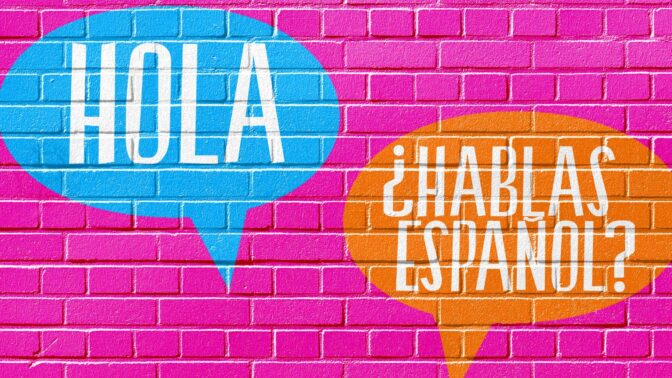How to Ace the IB Spanish Oral Exam: Tips & Structure Guide for SL & HL

The IB Spanish oral exam can pose a challenge for many students, especially those who do not regularly speak Spanish. Designed to test your ability to communicate effectively in a variety of situations, it carries a significant weight of 25% in the final Language B grade.
To master the oral component of your assessment and achieve your academic goals, you need to put in time and effort.
Does it make you feel stressed? Don’t worry! With a strategic approach, you can overcome communication barriers and build your confidence in no time. One of our talented Spanish teachers, Marta, shares some tips and tricks on how to ace your Spanish IB oral – they have already helped dozens of students get the best results possible.
She teaches Spanish IBDP, language B, as well as IGCSE and A Level and brings all of her experience to share her top tips with you. For personalised guidance, you can book a session with one of our TutorsPlus tutors.
But before we dive into it, let’s remind ourselves what actually happens in the exam.

Need help with IB Spanish?
IB Spanish Oral Exam Format (SL vs HL)
The Structure of the IB Spanish B Oral Exam
The oral exam consists of four parts: preparation, presentation, conversation, and discussion.
Preparation for presentation
The presentation is based on a stimulus that you choose from a set of two. These stimuli can be images (at the Standard Level) or excerpts from literary works (at the High Level). Either way, they are related to one of the five prescribed themes of the course.
You have 15 minutes to prepare your presentation. During this time, you can take notes, lay out a plan for your speech, or come up with some bullet points.
Presentation
The presentation typically lasts 3-4 minutes for SL students and 4-5 minutes for HL. You may use the notes you took during preparation.
Although the IB Spanish guide doesn’t have clear requirements for the structure of the presentation, our experience suggests that it is best to stick to the following:
Give a brief description or summary of the stimulus
In your description, you should mention the main elements, such as people, objects, actions, etc. However, don’t go into too much detail. The general description shouldn’t be longer than 30-60 seconds.
Explain the theme in general
This involves a short overview of the theme and its significance. You need to specify some aspects or issues that are relevant to the theme as well as how they affect people and society. It is also worth mentioning why you chose this stimulus and the theme. This step should take about 1 minute.
Analyse the stimulus in relation to the theme
Next, you should explain how the stimulus represents a specific aspect or issue of the theme, as well as point out the message or meaning it conveys. Don’t forget to give your opinion or perspective on the image or piece of literary work. This part of the presentation lasts about 2 minutes.
Provide an example from a target culture
Basically, you need to link the stimulus to a specific culture or country where Spanish is spoken. You should mention some facts about that culture and how it compares or contrasts with other parts of the Spanish-speaking world. Also, try to explain how this example helps you understand or appreciate the theme better. This step should take about 1 minute.
Provide a personal example
It is a good idea to share your own experience or situation related to the stimulus. You can also express your feelings or emotions and how they affect your identity. This step is optional, but it can help show your personal engagement.
Conversation
The IB Spanish oral exam continues with a follow-up conversation. During the next 5 minutes, examiners are going to ask questions about both the stimulus and presentation. For example, they can ask you to clarify some of your statements.
The purpose of the conversation is to demonstrate that you have the ability to use appropriate language functions, such as asking for clarification, expressing agreement or disagreement, making suggestions, and giving opinions.
Discussion
The conclusive part of the IB Spanish B oral is a general discussion. You will be engaged in a 6-8-minute discussion with an examiner on a topic related to one or more themes of the course. It is somewhat similar to the presentation, just without prior preparation. Therefore, it makes sense to follow the same structure.
The discussion should demonstrate your aptitude to understand and respond to questions, provide opinions, and participate in a meaningful dialogue.
Key Differences Between SL and HL
Spanish IB oral for HL and SL award 30 marks. In both cases, it accounts for 25% of the final result. Yet, these exams are carried out differently. While the format of the exam is similar for both levels, the expectations and assessment criteria differ.
For starters, the Spanish IB oral exam is more demanding for HL than for SL. Students must demonstrate a higher level of proficiency in Spanish and a deeper understanding of the themes. The topics for the presentation, conversation, and discussion may be more complex and abstract. Besides, examiners will expect students to show a greater degree of sophistication in their language use, including a wider range of vocabulary and more complex sentence structures.
Second, SL students give a presentation based on a visual stimulus, which is usually a picture or graph. In contrast, HL utilises an excerpt from one of the literary works studied during the course.
Finally, when it comes to the discussion, it is common to touch upon one of the themes of the syllabus at SL wherein HL students can expect questions across multiple themes.
Top Tips to Ace Your IB Spanish Oral
Now that you know what to expect, let us share some tips on how to prepare for the Spanish oral exam itself.
Create a Study Plan:
Marta points out that it all starts with a plan that reflects exactly what you need to study, how, and, and for how long. In particular, it should include daily speaking practice, regular reviews of vocabulary and grammar, and practice with past papers. Such a structured approach will help you make consistent progress.
Practice Speaking Spanish Regularly
Consistent practice is essential to build confidence and fluency. The more time you spend speaking Spanish, the more comfortable you’ll become.
How to do so exactly? The easiest way is to try and think in Spanish as you go about your day. You can describe your activities, make plans, and even have imaginary dialogues. Better still, if you find a Spanish-speaking partner. Conversation groups, language exchange meetups, and online services such as HelloTalk, Tandem, or Speaky can help you with that.
Why Recording Your Practice Speeches Helps Improve Spanish Fluency
Whenever you practice giving a presentation or having a conversation with a partner, record these sessions. You may not notice your mistakes on the go, but listening to the recordings later will help you identify areas for improvement.

Consume Spanish Media
It is beneficial to Immerse yourself in Spanish by watching movies, listening to podcasts, following social media influencers from Spanish-speaking countries, etc. This will not only improve your language skills, but also help you understand the culture. This understanding will come in handy during the discussion part of the exam.
Use a range of vocabulary and grammar structures
The examiners will be assessing your ability to use a variety of vocabulary and grammar structures. Therefore, you need to have a strong grammar foundation and build a good range of vocabulary upon it. This will help you express complex ideas and thoughts without a hitch.
Here are a few IB Spanish oral tips to impress your examiners:
- Don’t settle for basic words! Instead, you should try to expand your vocabulary with words related to the five prescribed IB Spanish topics. For example, instead of saying ‘Nuevo’, you can use a more advance alternative ‘Innovador’.
- To easier memorise new words, use them in practice (in dialogues, texts you write, etc.). It is also a good idea to create flashcards, mind maps, and even mnemonics.
- Go beyond basic sentence structures. Subjunctive mood, passive voice, relative clauses, and others will make your speech more natural and interesting. Things like ‘Me gusta leer y me gusta escribir’ are not enough for your level. A more advanced alternative would be ‘No solo me gusta leer, sino que también me gusta escribir.’
- When practicing your speaking, look for synonyms, alternative phrasings, or idioms for common words. This will not only improve your vocabulary but also demonstrate your ability to express yourself with precision. For example, you can easily replace ‘Buscar’ with an idiom ‘Dar con algo’.
Need help with this subject?
100 % of tutors are certified teachers and examiners
Be Confident and Composed
It is natural to feel nervous during your Spanish oral exam. However, staying calm and composed is paramount. Mindfulness and relaxation techniques may aid to manage exam stress. Right before the exam, you can try meditation or light physical activity. During your exam, breathing exercises will help regain your focus. Remember to speak clearly and confidently while making eye contact with the examiners.
Listen to and Respond to the Questions Carefully
Your ability to listen and understand is also under scrutiny. That’s why you need to listen carefully to the examiners’ questions and instructions. If you’re not 100% sure what you are asked, don’t rush with a response. Don’t be afraid to ask clarification questions since they are an essential part of an effective dialogue.
For example, you might have a following dialogue:
- Examiner: En la imagen que tienes delante, ¿cómo crees que se sienten los dos jóvenes?
- Student: Disculpe, ¿se refiere a los dos jóvenes del fondo o a los que están en primer plano?
- Examiner: Sí, exactamente, a los dos jóvenes que están sentados en el banco.
- Student: De acuerdo, gracias por la aclaración. Pues, por su postura relajada y las sonrisas en sus caras, diría que se sienten felices y cómodos el uno con el otro.
Practice with IB Spanish past exam papers and sample questions
You can get to know more about the format and structure of the oral exam by practising with past exam papers and sample questions. This will help you get a feel for the types of questions you may be asked and prepare you for the level of language and content required.
Use a range of language functions
As we have already said, examiners will be looking for your ability to use a range of language functions. These include asking for clarification, expressing agreement or disagreement, making suggestions, and giving opinions. Practice using these functions in your conversations with others and in your preparation for the exam.
We suggest that you make a list of useful expressions for each topic and actively use them when working with past papers or talking with a partner. A constant repetition will allow them to stick in your head and it will feel more natural to use them.
Use appropriate register and tone
Language register and tone largely depend on the context and purpose of a conversation. For example, if you are discussing a serious topic, use a more formal and serious tone. If a topic is more casual, an informal and relaxed tone is a more appropriate choice.
Be prepared to talk about a range of topics
The Discussion part of the Spanish oral involves a conversation related to one or more themes of the course. Hence, you need to be ready to talk about any topic whether it is personal experiences, current events, cultural practices, or social issues.
You have already discussed such topics in class, so there shouldn’t be anything unexpected. Still, it makes sense to do similar exercises at home, alone or in a study group. You can find pictures related to the themes (such as here) and simulate a possible exam experience – picture description, expressing your opinion, presentation, and so on.
How to Manage Time During the IB Spanish Oral Exam
The oral exam is timed, so you have to learn to manage your time effectively. Make sure you are aware of the time limit for each section and pace yourself accordingly. Do not spend too much time expressing your opinions and answering questions unless an examiner wants you to delve into it.
Again, you can improve your sense of time when practicing with past papers. You just need to set a timer and deliver a full presentation with clear organisation. To make the most of it, record your answers and listen back to find areas for improvement.
Seek feedback and guidance
It might be difficult for you to evaluate your own level of Spanish proficiency. Fortunately, you are not in isolation. Therefore, you can take advantage of feedback and guidance from your teacher or Spanish tutor. Ask them to listen to your practice sessions and make a conclusion on your strengths and weaknesses.
Marta summarises: “I believe the key to excelling in the IB Spanish oral exam is consistent practice, cultural immersion, as well as effective stress management. It’s not enough just to memorise vocabulary or grammar rules to succeed. You need to actually engage with the language and try to enjoy the learning process. Connecting with native speakers through tutoring and technology can provide invaluable real-world practice, which will make your preparation not only effective, but also enjoyable.”
TutorsPlus: Your Best Strategy to Ace IB Spanish Oral
IB Spanish oral exam can seem like a nerve-wracking ordeal, especially when you have to prove your language proficiently in front of a panel of examiners. Yet, with the right mindset and necessary skills, getting a maximum of 30 marks is not a pipe dream. So, what do you need to gain these skills and confidence? Practice, practice, and practice! Our tutors can help you with that.
We have built TutorsPlus around some of the best professionals in the educational field. Need someone to help you assess and polish your linguistic skills? We are happy to connect you with our knowledgeable and friendly experts. Contact us today at 022 731 8148 or and meet your IB Spanish exams well-prepared! You can book a session with Marta, our expert Spanish teacher, through TutorsPlus, and combine your Spanish preparation with support for other subjects like IB Maths or IB Physics.
For more information about tutoring options and fees, check TutorsPlus pricing.
A big thanks to Marta, our talented Spanish teacher who helped contribute to this article.
Marta was born and raised in Spain, and has a passion for global perspectives on teaching, learning and educational leadership. She teaches Spanish up to IBDP, Spanish B, as well as IGCSE and A Level and brings a wealth of expertise to her teaching. Marta strives to create a relaxed and engaging learning environment where her students can move quickly and effectively towards their language goals. If you would like a lesson with Marta click here.
By Sara Lloyd
Sara has been an education consultant for TutorsPlus for 15 years, and is an expert on international IB education. She is also a parent of two lively children.








